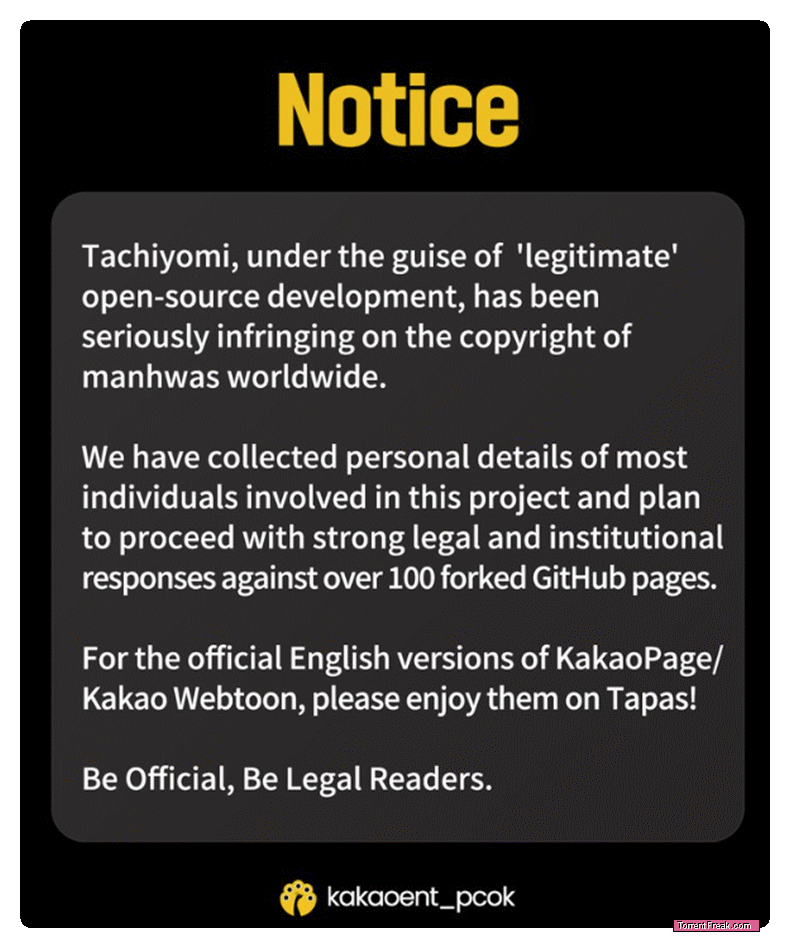-
 chevron_right
chevron_right
Crunchyroll, ADN et Netflix annonce l’arrivée d’un anime déjà culte
news.movim.eu / JournalDuGeek · Tuesday, 12 March - 14:02

 chevron_right
chevron_right
Crunchyroll, ADN et Netflix annonce l’arrivée d’un anime déjà culte
news.movim.eu / JournalDuGeek · Tuesday, 12 March - 14:02

 chevron_right
chevron_right
Mickey dans le futur, super-héros et Paul Dano… 9 livres à lire absolument en mars 2024
news.movim.eu / JournalDuGeek · Tuesday, 5 March - 17:33

 chevron_right
chevron_right
Pourquoi McDonald’s change de nom et devient WcDonald’s ?
news.movim.eu / JournalDuGeek · Thursday, 29 February - 09:19

The U.S. Tops the Manga Piracy Chart, While Iran Leads in Music Piracy
news.movim.eu / TorrentFreak · Monday, 12 February - 10:49 · 2 minutes
 Despite the growing availability of legal options, online piracy remains rampant. Every day pirate sites and services are used by millions of people worldwide.
Despite the growing availability of legal options, online piracy remains rampant. Every day pirate sites and services are used by millions of people worldwide.
New data released by UK-based piracy tracking company MUSO shows that pirate sites remain very relevant. And people have no trouble finding them either.
A few weeks ago it was revealed that video piracy continued to grow in 2023. A new report shows this uptrend is visible across all other content categories, reaching 229 billion platform visits in 2023, a 6.7% increase compared to a year earlier.
Music and software piracy are by far the smallest categories, but these saw the largest relative piracy increases. The number of visits to music and software piracy sites grew 13.4% and 14.1% respectively over the past year.
TV piracy remains the most popular among consumers, however, accounting for almost half of all piracy traffic with 103.9 billion visits in 2023. The publishing category takes second place with 63.6 billion visits, followed by 29.6 billion film piracy visits.
| Category | Visits | Market Share | Growth YoY |
|---|---|---|---|
| Data: Muso.com | |||
| TV | 103.9 billion | 45.4% | 4.2% |
| Publishing | 63.3 billion | 27.6% | 7.4% |
| Film | 29.6 billion | 12.9% | 6.5% |
| Music | 17.1 billion | 7.5% | 13.4% |
| Software | 15.2 billion | 6.6% | 14.1% |
In recent years, the publishing category has seen a sharp traffic increase. This rise is mostly driven by manga comics, which have drawn more pirate site visits than film piracy in recent years.
“The global phenomenon of Manga, Japanese comic book and graphic novels, has driven publishing piracy to new heights in recent years, overtaking film piracy and the second most pirated medium in 2020,” MUSO writes .
Manga now dominates the publishing category. While traditional book publishers have been very active on the anti-piracy front recently, more than two-thirds of all ‘publishing’ pirates (69.2%) are drawn to manga sites.
The United States is in the lead as the main source of traffic to manga sites. With 13% of all visits, it leaves all other countries, including Japan, trailing behind.
Looking at the TV category, we see that the United States remains the top traffic driver overall. With more than 14 billion visits it puts runner-up Russia in distant second place.

The TV category also includes anime content which, unlike our yearly overview , is included in MUSO’s top 10 list of most viewed TV series. The Last of Us remains the winner, however.
In recent years TV piracy has been dominated by streaming sites, which represent direct competition for Netflix and other authorized platforms. These pirate streaming sites now make up 96.3% of all traffic, marginalizing torrent sites and download portals.
It’s no surprise that the United States is leading in the TV and Publishing categories due to the sheer size of the population and readily available broadband access. However, this dominance doesn’t apply to all categories.
Looking at movie piracy, India is the clear winner by a wide margin ( 30%! ), according to MUSO’s data. Interestingly, visits to this category declined sharply in the second half of 2023 for reasons that are not immediately clear.
In the music category, Iran is the surprising leader with 11.8% of music piracy visits, followed by India and the U.S. as runners-up. This includes traffic to stream-ripping sites, download portals, and streaming sites.
Finally, MUSO attributes most software piracy to Russia, with the U.S. and China closely behind. This includes traffic to app piracy sites. Needless to say, all software piracy takes place through direct download portals.
From: TF , for the latest news on copyright battles, piracy and more.
 chevron_right
chevron_right
Mauvaise nouvelle pour les fans de One Piece et Dragon Ball
news.movim.eu / JournalDuGeek · Wednesday, 7 February - 15:06

 chevron_right
chevron_right
My Hero Academia : You’re Next officialise sa date de sortie avec un trailer explosif
news.movim.eu / JournalDuGeek · Tuesday, 30 January - 09:45

Tachiyomi Manga Reader: Threats Motivate Pirates & Boost Engagement (Update)
news.movim.eu / TorrentFreak · Saturday, 13 January, 2024 - 21:32 · 7 minutes
 For those not fully engaged in the global manga/webtoon phenomenon, the scale and depth can be a little bewildering.
For those not fully engaged in the global manga/webtoon phenomenon, the scale and depth can be a little bewildering.
Fans are knowledgeable, passionate, and growing in numbers, with many older enthusiasts having been introduced to the content via pirate sites, at a time when content was impossible to buy legally.
Availability is much improved today but old habits die hard; pirate sites haven’t gone away either, a major challenge for content owners everywhere, in every content category.
One of the companies attempting to reduce piracy of its ‘webtoon’ content is South Korea-based Kakao Entertainment. Unlike other large copyright holders that have coupled strong anti-piracy responses with generally moderate public profiles, Kakao prefers a different approach. The company’s anti-piracy team constantly engages with the public on social media, often with controversial results.
Of course, Kakao is entitled to these freedoms. The company owns the content it seeks to protect and since almost all anti-piracy strategies fail to a greater or lesser extent, trying something different could inject new life and lead to fresh ideas.
That being said, the history books show that some scenarios should be approached with caution; when certain ingredients are combined, there’s a heightened risk of unpredictable results.
For the last ten days or so, open source software ‘Tachiyomi’ has found itself under the spotlight following an approach by Kakao’s anti-piracy team. But first, what does the software do? A manga aficionado familiar with the software informed TorrentFreak as follows:
“Tachiyomi is probably the ultimate Android-based manga/webtoon reader with plenty of features and extensibility. The development team behind it has been hard at work for close to 9 years since 2015, and has tirelessly iterated upon it, to create possibly the best kind of reader there is today.”
Tachiyomi is free to use, with the added bonus of being completely open source. In common with similar tools, such as web browsers or torrent clients, Tachiyomi contains no third-party content and makes no attempt to lock users into specific sources.
However, through various extensions, users are free to choose their own, including unofficial sources from where it’s possible to download content, including pirated content, without ever paying a penny.
We’re informed that on January 2, 2024, project contributors received communication from Kakao’s representatives who made several demands in respect of this functionality.
A source familiar with events informs TorrentFreak that the main developer of Tachiyomi was instructed to terminate the nine-year-old project by deleting all versions of the app, including those on GitHub.
He was further ordered to delete any comics uploaded to the app, despite the app carrying no third-party content, period. A further demand sought the immediate removal of all Tachiyomi forks on GitHub.
We understand that later on January 2, Tachiyomi’s main developer advised Kakao that the best way to take actual content down would be to file DMCA notices at problematic sites, over which the project has no control. He also offered to help, advising the company that he was willing to remove individual sources from Tachiyomi’s separate extension repo if those were considered an issue.
Three days later, Kakao reportedly presented a spreadsheet that listed allegedly infringing content available from five third-party sites. For one of those sites, Tachiyomi had no extension; for the remaining four, the Tachiyomi team would soon take appropriate action.
New versions of Tachiyomi were released between January 6 and January 8 without a list of extensions being preloaded. Moving forward, those who download Tachiyomi will find that extensions are no longer part of the ‘out-of-the-box’ experience.
An announcement on tachiyomi.org dated January 9 spoke of “extenuating circumstances” and a decision to purge extensions to “ensure the long-term sustainability of Tachiyomi.”
“As of now, Tachiyomi is transitioning to a fully bring-your-own-content model. What this means is that you can still enjoy Tachiyomi for manga reading, but you’ll need to source and add your own content,” the statement added.
As detailed above, the Tachiyomi team responded to Kakao’s complaints quickly and went on to take significant action. Arguably the new versions of the app could’ve been pushed even sooner absent a 48-hour delay to determine certain details.
However, what appeared to be an amicable solution triggered an unexpected Twitter post by Kakao’s anti-piracy team. It implied that installing Tachiyomi carries a risk of viruses.
The post has now received 59K views and to quickly summarize the first few dozen responses, people didn’t especially appreciate a long-established open source app being described as a virus risk. One of the more polite responses can be seen below.
For reasons that can vary from person to person and sometimes between communities, people often feel protective of open source projects. In some respects, their open nature seems to provide a small oasis of trust and when that’s surrounded by free, open source software, any perceived threat risks an unpredictable response.
It appears two can play that game.
Having obtained compliance from the Tachiyomi team without a struggle, and then declaring the software a virus risk regardless, on Wednesday Kakao’s anti-piracy team took to Twitter once again, this time to threaten people who forked the Tachiyomi repo.

With over 154K views, this post reached a considerably larger audience and prompted almost 500 comments. If any weren’t critical, we apologize for missing them; they aren’t particularly easy to find. The same can’t be said about the Community Notes panel featuring user responses to the claims in the original post.
Kakao is a huge company overall so it’s possible that communications policies vary from unit to unit. Anti-piracy issues may even be completely exempt or considered fair game, but it would be interesting to see how the negative results so far dovetail with a report published earlier this month.
According to The Korea Times , reform measures are being prepared to “reverse the negative public sentiment” toward the company in general, not necessarily Kakao Entertainment in its own right, but nothing exists in a vacuum.
When any type of site, service, or application is subjected to legal threats, the possibility of unintended consequences or mere fallout is something worth keeping an eye on. From basic DMCA notices through informal discussions to full-blown demands, the overall aim is usually evident from the nature of the requests.
In this case, it appears that a complete end to Tachiyomi or an effective end due to limited functionality, would both amount to the same thing; a massive loss of interest in the software and ultimately, game over. However, while Tachiyomi no longer supports any third-party extensions, it does support third-party repositories, suggesting that extension development and functionality is now the responsibility of others.
Meanwhile, Tachiyomi’s popularity appears to be trending up, not down as intended.
‘GitHub Trending’ is a daily report that features repos trending in popularity on a particular day. Via RSS feeds, trending repos arrive here on a daily basis; this week the Tachiyomi repo has featured in the list, along with at least two others, one of which may have even appeared twice, at least from memory.
But at least things didn’t get any worse from here, surely? Well….
There are many mechanisms to measure an app’s popularity on GitHub, with some more accessible than others by default. Since receiving a gold star on GitHub is universally considered a positive for most projects, another project on GitHub offers a great way to quickly visualize current and historical star data for a given project.
The image below shows that between December 14 and December 29, Tachiyomi received an average of 15.87 stars each day. In the two weeks that followed, during which Tachiyomi found itself under threat, the daily average more than doubled to 43.92 stars each day.
Despite the efforts to shut the project down and the imposition of decreased out-of-the-box functionality, it appears that support for the software actually increased. While somewhat counterintuitive, targeting open source software always risks unpredictable result.
—
Update January 13 : There’s a new statement on tachiyomi.org suggesting that the software will no longer be actively developed.
“Tachiyomi will no longer be actively developed. It may continue to work for you for the foreseeable future but there will be no support for it nor the official extensions,” it reads .
From: TF , for the latest news on copyright battles, piracy and more.
 chevron_right
chevron_right
Ce manga culte tire sa révérence après 40 ans d’existence
news.movim.eu / JournalDuGeek · Monday, 8 January, 2024 - 13:30

DHS/HSI Assist Korea to Arrest Operator of “World’s Largest Manga & Webtoon” Site
news.movim.eu / TorrentFreak · Tuesday, 2 January, 2024 - 13:57 · 5 minutes
 On December 1, 2023, an interesting piece of news began to gain traction in South Korea and beyond.
On December 1, 2023, an interesting piece of news began to gain traction in South Korea and beyond.
First published by national broadcaster KBS, the report claimed that after five years of tracking, major webtoon publisher Kakao Entertainment had “identified the operator of ‘M’, the world’s largest illegal comics and webtoon distribution site.”
This claim piqued our interest. Half a decade of tracking is significant and tends to suggest an important target. But after all that time, why give a heads-up in the media to the operator of the largest site of its type in the world?
Since it’s relatively easy to identify the world’s largest sites operating in that sector, why go on to mysteriously refer to the platform only as ‘M’? The answer to that question may lie in the fact that several of the largest sites have names beginning with that letter. However, taking such claims at face value isn’t always advised.
In the fourth paragraph of the article, a comment from Kakao Entertainment further muddied the waters. In a pretty sizeable shift away from the original claim, that the operator of ‘M’ had been identified, Kakao stated (emphasis ours):
“ If we identify the operator, we will be able to take civil and criminal action against each individual for violating copyright law, which will likely lead to a more fundamental solution to the problem of illegal distribution.”
In his book The Art of War, Sun Tzu wrote that the whole secret lies in confusing the enemy, so real intent cannot be fathomed. If that was the plan, it certainly worked here. Meanwhile, other publications seemed much more confident.
“World’s Biggest Manga and Webtoon Piracy Site Likely to Be Shut Down,” wrote CBR , “The Top Manga and Webtoon Piracy Site May Be Closed Soon,” ComicBook added .
On December 19, 2023, South Korea’s Ministry of Culture, Sports and Tourism announced the culmination of a major online piracy investigation and a significant arrest.
The press release issued by the Ministry of Culture immediately scaled down the nature of the target. The world’s largest illegal comics and webtoon site was now being described as the largest site of its type in Korea. That doesn’t diminish the importance of the site locally but does set it apart from other sites with up to 60 million visits per month more.
After naming the site for the first time, the statement reveals that the operator of ‘Shelter’ was arrested following cooperation between the Ministry of Culture’s Copyright Crime and Scientific Investigation Unit, Homeland Security Investigations (HSI) in the United States, and the Korea Copyright Protection Agency.
“The operator of the ‘shelter’ site, which was visited by about 21.7 million people (according to SimilarWeb) in ’23, was provisionally found to have earned about 340 million won [$35 million] in advertising revenue,” the statement notes, adding that the platform illegally shared almost 27,000 titles causing “significant damage” to the publishing industry.
“The site was located overseas, which made it difficult to investigate the operator, but through active international cooperation and collaboration with the U.S. Homeland Security Investigation Agency, we were able to identify access from a specific space in Korea, and based on this, we were able to identify and arrest the operator of the ‘Shelter’ site.”
Information released by the authorities provides no personal detail on the alleged operator of Shelter, so age and arrest location can’t be reported at this time. However, images of the raid distributed by the Ministry of Culture appear to show where Shelter was operated from.
The contrast between $35 million in advertising revenue and the hardware on display has been a topic of discussion since the raid, and probably best summed up by the comment , “The shelter operator lives more frugally than I thought.”
While the name ‘Shelter’ is now being mentioned openly, its full name and online location aren’t part of the information released to the public. That may be due to the platform remaining online, subject to limitations presumably put in place by the site’s operator.
While there’s a likelihood that other domains exist, Shelter operates from 1412.live. The authorities claim that the site marketed itself as a comic review platform but was really a pirate-linking site in disguise.
As far as we can determine, users of the site posted links to comics hosted on third-party file-hosting platforms for other users to download via the site.
Visitors to the platform are currently greeted with a popup notice in Korean, translated as follows;
Hello. I am very sorry to leave you with bad news.
Regarding the link posted on the book information bulletin board on December 5th. A crackdown was carried out by the Ministry of Culture, Sports and Tourism.
As previously announced, the book information bulletin board is closed and can no longer be used. In addition, we would like to inform you that all posts and comments related to sharing or requesting novels or posting download links are strictly prohibited and subject to sanctions.
We would like to apologize to the rights holders who suffered damage.
A browse around the platform reveals several items of interest. Not only does Shelter have many rules that can result in suspension, it also has a section containing a list of rightsholders who have complained about content being shared without permission. Linked from the frontpage under the title “ Protection List ‘, the list is actually hosted at Notion.
The text is in Korean but when translated, reads as follows:
Sharing pirated files by uploading them directly to an external server or cloud is prohibited by international copyright conventions.
The operation team is unable to verify direct infringement of URLs that link to third-party external websites, but if direct infringement is confirmed, posts may be deactivated and penalty measures may be taken without notice.
For registration restriction request procedures, please refer to the
Posting Takedown and Rights Protection document.
Traffic data obtained from various sources broadly supports the 21.7 million visits per year claimed by the authorities. For the site’s main domain, 1412.live, SimilarWeb currently reports 1.4 million visits per month and SEMRush reports 4.3 million over three months. However, traffic appears to have diminished in the last few months of the year, so more recent figures may not be especially informative.
With some of the largest manga sites currently enjoying between 50 and upwards of 80 million visits per month, Shelter was nowhere near the largest.
On a local basis, there’s no question it was significant, just not as significant globally as people were initially led to believe, or named in the manner that was implied either. Whether the site’s operator made $35 million from advertising remains a question, at least in light of the frugal hardware on display.
From: TF , for the latest news on copyright battles, piracy and more.